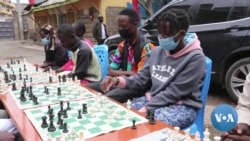More than half of the Kenyan capital's nearly five million people live in slums, where many young people are lured by drugs and crime. In one neighborhood, a group is using the game of chess to help transform the lives of young people.
We are in Mukuru Kwa Njenga an informal settlement that is about thirteen kilometers from Kenya’s capital Nairobi. Among the youth here practicing chess, who number about twenty, is Sarah Momanyi. At 15, she’s a teen sensation in the sport, but her start wasn’t easy.
"When I first started playing chess, it was hard because I was like the only girl, and my grandmother, she never supported me, because of playing with boys. It was really hard," she said.
It’s been five years since a sports outreach ministry introduced chess to this informal settlement to help keep young people away from drugs and crime.
Every Saturday, the students here practice the game for five hours. The sport has provided a safe avenue for Momanyi and other young residents to hone and perfect their skills.
The chess initiative has drawn about 800 students from various schools within Mukuru Kwa Njenga, which has a population of about half a million people.
Josephat Owila is a national chess instructor and head coach with the Sports Outreach Ministry.
“Socially they are good because they can be able to coexist with others in the society also in their schools, their respective schools. They are performing well, which means that they are critical thinkers and are creative also,” he said.
John Mukabi, the head of Chess Kenya, the national body that manages the sport, told VOA the sport faces challenges in the country.
“For these informal settlement areas, like here in Mukuru Kwa Njenga, they don’t have internet connection, they need laptops and things like that and also chessboards,” he said.
Still, the young residents play the game despite obstacles. As for Momanyi, she continues to practice every day and hopes to one day become a grand master.





